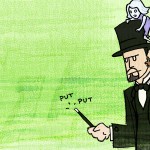When Hugo Chavez died last week, we saw an eruption of responses on both sides. As the posturing and politics becomes unbearably pretentious, we should take a moment to reflect on government in this 21st century.
In the wake of Chavez’s death, Venezuelans with tears streaming down their faces appeared on the front pages of newspapers (by which I mean internet news sites – are newspapers still a thing?). The death of a sitting head of state is always a traumatic event for a nation. Some of our readers may remember when President Kennedy was murdered on a Dallas morning in November. At that moment, there was no discussion of his politics, his record, his character. There was only a nation, shocked and in mourning.
Yet Chavez was not our leader, not our head of state. And in fact he had made a name for himself as an adversary – indeed, a would-be enemy. Chavez exploited a fundamental divide in American politics, and the reaction here to his death proves how deep the chasm runs. For conceptual convenience, we can look at the reaction on a left-right spectrum. On the far left are those like Noam Chomsky and Sean Penn, those who believe that Americanism is a kind of curse on the world, a bloated and sinister exploitative caste system. To these, Chavez spoke truth to power. He was the people’s David standing up to the imperialist Goliath.
The right reacted with outrage and disgust. Chavez was a communist thug cut from the cloth of the murderous Castro regime, a populist demagogue playing to the people’s hopes and fears. That Americans could countenance – admire, even – the man who stood in the United Nations and not-so-subtly identified our president as Satan himself, why I never! Chavez is Stalin and Mao and the Cylons all wrapped in to one eminently hateable package. Ding dong, the witch is dead!
Which reaction is better? Rather than say that both sides are partly right, in this scenario it is easier to say they are both just wrong. Chavez was a close ally of Castro’s Cuba and was willing to throw in with great figures like Mahmoud Ahmadinejad and Bashar Assad despite having nothing in common except a disdain for the United States. But, brutal as Chavez may have been, he was no Che Guevara, let alone a Pol Pot or Chairman Mao. He certainly provided to Venezuela’s poor, at least in the short term, and no doubt the downtrodden of that nation glimpsed a ray of hope that the boot of corruption might finally lift from their necks for just a moment.
In the end, Chavez was no better than the democrats who brought down Athens or the Jacobins who repeated history in revolutionary France. Edmund Burke said, “It is a general popular error to suppose the loudest complainers for the public to be the most anxious for its welfare.” Even as he nationalized the country’s oil wealth to provide heating oil to the poor, Chavez amassed a fortune estimated at $2 billion. Worse, markets are famously good at allocating wealth, and Chavez has assigned billions of dollars worth of GDP by fiat. The resulting harm to Venezuela’s economy will devastate its poor. A society cannot be organized based solely on hands clamoring for bread.
So should Christians rejoice at the death of a self-declared enemy, one the Psalms might call a wicked ruler? CaPC’s Drew Dixon and Alan Noble reflected on this question when our boys finally took down Osama bin Laden. Here’s Alan:
Following Christ means a radical refocusing of our desires, loves, goals, hopes, and pleasures. While the world and our flesh might invite us to turn every event into opportunity to promote and delight in ourselves, Christ calls us to be outward oriented, towards God and our neighbors. This gratuitous giving of ourselves can take many forms, but it fundamentally requires that we question the orientation of our hearts and our words, and, in this situation, consider what it means to love one who cursed us, and to even love him after his death.
Just so. We must tend our hearts and, when we fail, ask the Shepherd to tend us instead. Note, though, that Jesus does not require us to pretend the world is a better place when unjust men are on the throne. Indeed, the lesson of the Bible and of history is that this will be the rule rather than the exception. Hugo Chavez built a personality cult in Venezuela, his image plastered across the land while it became dangerous even to challenge him publicly. I think of Jesus holding the Roman coin emblazoned with the image of Caesar Augustus and I can’t help but think that is the kind of power Chavez sought (no doubt for some noble purposes – indeed, the emperors were sometimes competent and benevolent rulers). It was not Paul’s place to foment insurrection against Rome, but that is not the same thing as being glad of its laws and state religion.
We have enjoyed several centuries of limited government and self-determination. Aggregations of state power in one man or a small council have always been met by Americans with skepticism, protest, or armed force at the extreme. Our experience as a people teaches us that men like Chavez are dangerous even when (perhaps especially if) well meaning. As Americans and Christians, our prayers should be with the people of Venezuela. Let us pray that sensible rulers emerge from Chavez’s departure from the mortal realm. Let us pray that Venezuela’s poor do not lose the modest gains they have seen over the decade of Chavez’s rule and that the people of that nation look to the long term. And, as always, let us pray that God’s strong hand will be manifest to a nation whose future is uncertain.











